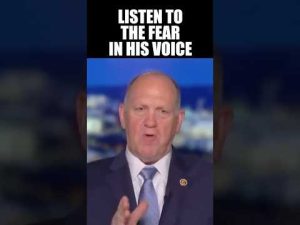**America’s Debt Crisis: A Call for Coalition and Common Sense in Washington**
In a landscape fraught with economic turmoil, America’s national debt has surged past the staggering figure of $37 trillion, and it continues to climb at an alarming rate. This financial predicament not only poses a threat to the economy but also jeopardizes the savings and futures of hardworking American families. With President Trump advocating for fair trade and strong borders, the urgency for practical solutions has never been more critical. Many citizens are turning their eyes toward tangible assets like gold and silver as a safeguard against this financial avalanche, signifying a search for stability amidst the chaos.
The discourse around America’s financial future isn’t just about numbers—it’s about leadership and direction. Conservatives are looking for a figure to rally behind during these trying times, and many believe that JD Vance could be the breath of fresh air the Republican coalition desperately needs. The prior conversations surrounding coalition-building emphasized the importance of having a unified front. Influential voices within the conservative movement reflect on Charlie Kirk’s ability to maintain focus and advocate for strategic alliances that moved the agenda forward without getting bogged down in inconsequential disputes.
Vance, now positioned prominently as Vice President, has the unique opportunity to build bridges within the fractured party and to articulate a vision that resonates with a broad base. His existing relationships with various factions on the right could prove pivotal in uniting those who have ideas worth promoting while gently phasing out the distractions that detract from productive conversations. The Republican Party must embrace a strategic approach to coalition-building, reminiscent of tactics employed by past leaders like President Nixon, who successfully navigated complex political waters by uniting various factions while skillfully distancing from counterproductive elements.
While Vance seems equipped to take on this mantle, challenges remain. The conservative movement is currently experiencing an identity crisis, with debates emerging about the true direction of the party, especially in light of divisive figures and foreign policy questions. From Israel to immigration, the discussions are intense, but they’re vital. The party is at a crossroads where clear lines must be drawn to ensure the movement thrives collectively, rather than succumbing to infighting that could weaken its effectiveness during crucial election periods.
Kirk’s legacy as a coalition builder underscores the importance of uniting behind a vision that champions conservative values without alienating segments of the electorate. Vance’s ascension to a more prominent role in the GOP could pave the way for a revitalized movement, one that seeks to honor its traditions while adapting to the pressing realities of the modern world. The focus should be on fostering discussions that challenge existing paradigms without descending into chaos over petty disputes, and Vance’s approach could lead the way toward that ideal.
In conclusion, the American financial landscape may appear daunting, but it also offers an opportunity for the Republican Party to truly galvanize around shared values and ideals. With strong leadership and a willingness to engage in productive debates, the path forward can be paved not just with gold and silver, but with unity and purpose. The stakes have never been higher, making it imperative that conservative leaders rise to the occasion and steer the ship toward a brighter, more financially sound future for all Americans.







